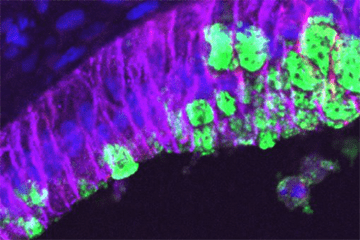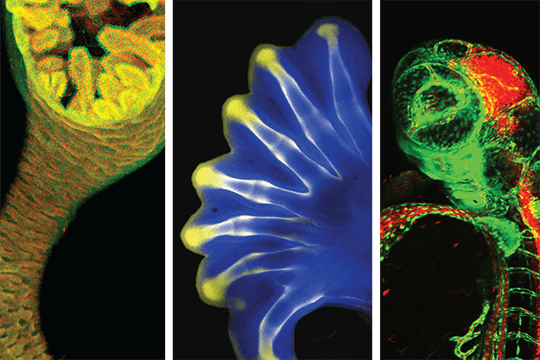Providing Centralized Access to hPSC Expertise, Technologies, Reagents and Training
Human pluripotent stem cells (hPSCs) are primary cells that can be expanded indefinitely in culture and can be directed to differentiate into all human cell types.
Consequently, hPSCs have revolutionized our ability to study the fundamental mechanisms of human development; to generate new models to investigate human health and disease; and to produce cells/tissue to facilitate identification of new therapeutic targets, validate the activity of drug candidates in disease-relevant human cells, and assess human-specific toxicity of lead compounds.
Cells derived from hPSCs are also increasingly being evaluated as transplantation therapies in clinical trials for a wide range of diseases.
Founded in 2008, the Pluripotent Stem Cell Facility (PSCF) was one of the first shared facilities in the United States to support hPSC research. Since then, our services and training have expanded significantly but our mission remains the same: To facilitate, support and enhance basic and translational pediatric research by providing centralized access to hPSC expertise, technologies, reagents, and training.
Our Services
The implementation of hPSC technologies such as induced pluripotent stem cell generation, the production of hPSC lines containing custom gene edits, and the directed differentiation of hPSCs into 3D organoids, is technically challenging and labor-intensive.
The PSCF removes barriers to using hPSC technologies by providing access to the necessary expertise, training, materials, and protocols for investigators that wish to expand their research into this area. Specific services available through the PSCF include:
- Distribution of high quality, well characterized, and reliably archived human embryonic and induced pluripotent stem cells (hESCs and iPSCs)
- Generation of new patient-specific iPSC lines
- Introduction of custom genome edits to hPSCs via CRISPR/Cas technologies
- Access to routine hPSC quality control and authentication assays
- Generation of hPSC- and primary tissue-derived 3D organoids
- Access to hands-on training in the culture and manipulation of hESCs and iPSCs
- Provide training in the generation and culture of hPSC- and primary tissue-derived primary organoids
- Utilize and develop protocols for directed hESC/iPSC differentiation
View All Techniques and Services
In addition to Cincinnati Children's and University of Cincinnati researchers, we also offer most of our services to external partners. Performing your experiments in our facility has several advantages:
- Significant savings in time and cost versus establishing procedures and approvals in investigator labs
- Assistance with experimental design and data interpretation
- Access to hands-on training
- Access to quality-controlled reagents
- The ability to perform approved experiments using our ESCRO (Embryonic Stem Cell Research Oversight) protocol approval
Acknowledgement Statement
This [publication, project, or research] was made possible, in part, using the Cincinnati Children’s Pluripotent Stem Cell Facility (RRID: SCR_022634). (Optional): We specifically acknowledge the assistance of [name(s) of staff member(s)].





